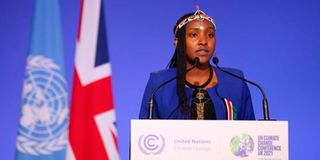Kenyan climate activist pleads for action at COP26

Elizabeth Wanjiru Wathuti delivers her speech at the climate change conference in Glasgow.
Kenyan climate activist Elizabeth Wanjiru Wathuti made a show-stopping presentation at the ongoing Glasgow climate change conference, outlining the price developing countries have to pay for wanton pollution by the developed nations.
In an address that left the delegates, including British Prime Minister Boris Johnson, visiting heads of state and top ranking government officials across the globe stunned and reflective, Ms Wathuti said it was time for the developed nations to stop their empty promises on the fight against climate change and act.
The founder of the Green Generation Initiative, an organisation that nurtures young people to love nature and be environmentally conscious at a young age, detailed how millions of children in sub-Saharan Africa are suffering from the failure by the developed countries to take decisive action in the fight against global climate change.
In a moving speech at the closing of the opening ceremony, the 26-year-old from Tetu, Nyeri County – the birthplace of the late Nobel Laureate and renowned environmentalist Wangari Maathai – pointed out how more than two million Kenyans are facing climate-related starvation.
Alarming trend
The situation, she explained, has been caused by failing rainy seasons in the past year, with the situation only set to get worse, with scientists saying it may be another 12 months before the waters return again.
This has left rivers across the country dry, harvests failing and store houses empty, with animals and people dying, calling for action from the global leaders to reverse the alarming trend.
“I need to tell you what is happening in my home country right now as you sit comfortably here in this conference centre, in Glasgow. I have seen with my own eyes, three young children crying at the side of a dried-up river after walking 12 miles with their mother to find water. Please open your hearts,” appealed Ms Wathuti.
“The decisions you make here will help determine whether the rains will return to our land. The decisions you make here will help determine whether the fruit trees we plant will live or perish. The decisions you make here will help determine whether children will have food and water,” she added.
However, the devastating effects of climate change are not isolated to Kenya.
Water scarcity
She said that by 2025, half of the world's population will be facing water scarcity, but more alarming is that by 2050, the climate crisis will have displaced 86 million people in sub-Saharan Africa alone.
This, despite adults in the region only being responsible for just half a percentage of harmful emissions while the children are responsible for none.
“This is not only happening in Kenya. Over the past few months, there have been deadly heat waves and wildfires in Algeria and devastating floods in Uganda and Nigeria. And there is more still to come,” she said.
“I would like you to join me in holding a moment of compassionate silence for the billions of people who are not here with us today, whose stories are not being heard and whose suffering is not being felt. Please open your hearts. If you allow yourself to feel it, the heartbreak and the injustice is hard to bear,” added the activist.
The 2021 United Nations Climate Change Conference, also known as COP26, is the 26th such conference, being held in Glasgow, Scotland, United Kingdom, between October 31 and November 12.
The youth activist said that through the Green Generation Initiative, 30,000 fruit trees had been grown to maturity, providing desperately needed nutrition for thousands of children in Kenya every day.
However, she is worried that the efforts might prove futile, saying the trees and the life-saving food the trees will bear will not survive on a 2.7 degrees’ Celsius planet.
Ms Wathuti explained that she was inspired by the late Prof Maathai to found the organisation with the belief that it is the responsibility of adults to ensure that children have food and water.
“I believe in our human capacity to care deeply and to act collectively. I believe in our ability to do what is right. If we let ourselves feel it in our hearts. So for these next two weeks, let us feel it in our hearts. The children cannot leave on words and empty promises. They are waiting for you to act. Please open your hearts and then act. Thank you,” she ended her emotional plea.





